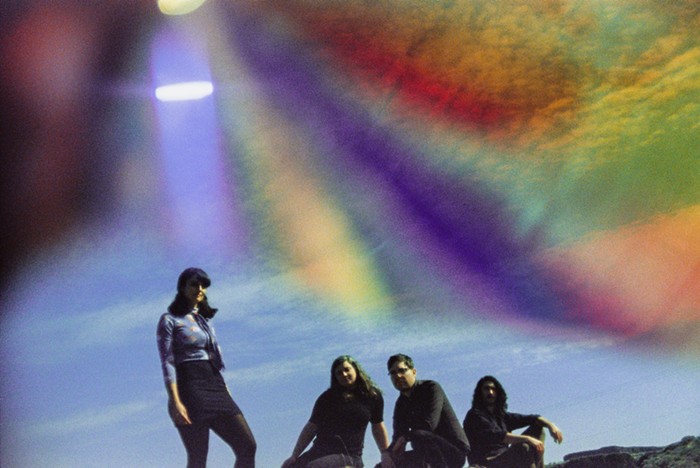It happened almost by accident. Hardened by a half-decade spent working in nightclubs soundtracked by the relentless 4/4 thump of house music or the assaulting bass drops and hyperactive rhythms of drum and bass, I'd been unfairly prejudiced against anything referred to as "electronic music" for years.
But these were new times. It was 2009, and I'd left the nightclub industry for my first-ever office job at The Stranger, hired partly due to my history of freelance writing about rock and roll and punk, and goddamnit, I was going to have an open mind about music from there on out. With the position came a slew of promotional e-mails from publicists, links to songs and downloads and music videos, CDs in the mail (back when that was still a decent idea), and a general deluge of sensory overload.
Somehow, Fuck Buttons' second full-length, Tarot Sport, ended up on my hard drive, which defied my policy of vetting releases from unknown entities at the time: Bad band names go in the trash; same with bad album art.* And as far as band names go, Fuck Buttons didn't strike me as a particularly great one.
In short order, though, Tarot Sport had wholly arrested me. In long order, it has become my go-to soundtrack for writing, for coding, for fast drives at night, for waking up in the morning, for rousing bouts of data entry, and for running—good lord does it work for running. There is something in the majesty of the surging, buzzing chord progressions and hypnotic, propulsive repetition and rhythm of these songs that, when combined with the endorphins (the brain's naturally occurring opiates) of a runner's high, brings on a sense of euphoria that cannot be matched by the finest illicit substances. "A lot of people have said they use it for working out and the gym, and that's great, I think," says Andrew Hung via a spotty Skype connection from his home in London. "If I were egotistical, I'd say it's [due to] the power of the music [laughs], but really I attribute that to the lack of vocals. There are no words to put you off of your homework or at the gym or anything like that."
Humble downplaying aside, there seems to be some consensus out there on the matter. It often comes up interviews, and Danny Boyle, for instance, selected "Olympians," a particularly driving number from Tarot Sport, to help score his 2012 Olympics Opening Ceremony. In terms of Fuck Buttons as a computer-work or writing aid, some studies have suggested that music with a fast beat, or at least certain combinations of "rhythmic light and sound stimuli," might promote concentration and alertness, and possibly even treat symptoms of ADD and help to improve academic underachievement. However, one should be wary of the flood of dodgy websites and YouTube videos touting "brainwave entrainment," "brainwave mind voyages," and the like. The research is far from extensive, and the specific effects are still unproven.
But there's also something very punk rock about this electronic duo from the United Kingdom. They often seek out cheap keyboards and other equipment—in the beginning, often sourcing them from car boot sales (a British term for a sort of swap-meet/garage-sale hybrid). "We see ourselves very much as a live band. We write in a live sense—we have the same setup as when we're playing live. We're not just sat in front of a laptop," Benjamin Power told London culture website the Quietus after the release of last year's Slow Focus. They also insist on writing only when they're together, with no preconceived ideas going into the studio.
"Ben has played in traditional bands before, and my instincts are toward traditional bands and how they write, like more of a jamming process," says Hung. "When you play live, you figure out what works and what doesn't, and then you put that back into the writing process." Perhaps it's this approach that produces the palpable vitality and sense of composition I'd not previously heard in electronic music. It's almost certainly conducive to the duo's live show, where those car-boot keyboards are made into purveyors of mammoth, grinding aural triumph.
Whatever it is, there's something that's just downright stunning about the work of these two, and it's opened me to a vast world of new sounds. I'll never sneer at the term "electronic music" again. ![]()
* If this sounds harsh, I'd like to note that studies increasingly suggest that the human mind immediately and unconsciously judges for warmth and competence when meeting someone new. Even newer research suggests that these split-second judgments are often wrong, but really, with that amount of new music vying for your attention, you've got to employ some sort of vetting process, no matter how arbitrary.



















